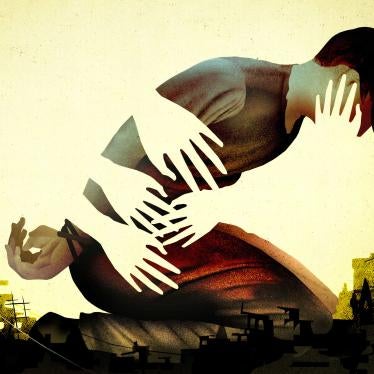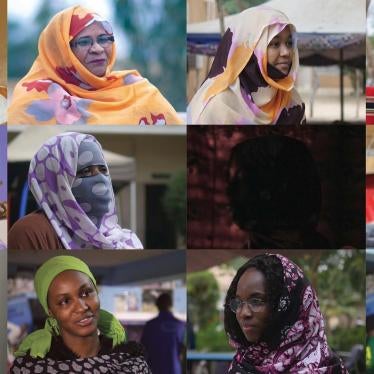(Rabat) – Morocco should enact a meaningful law on domestic violence and repeal the penal code provision that in practice has allowed men accused of raping or having sex with minors to avoid prosecution if they wed their victims, Human Rights Watch said today. A 16-year-old girl apparently took her life on March 10, 2012, after entering a marriage under these conditions.
The death of Amina Filali in a village in northern Morocco has fueled a public debate around the controversial penal code article 475, including demonstrations in Rabat and other cities, and extensive coverage in state and independent media. However, combating violence against women and girls in Morocco requires not only abrogation of article 475 but a host of additional legal reforms that ease the obstacles to prosecuting rape and domestic violence, as well as policies to ensure that victims can get services they need, Human Rights Watch said.
“Article 475, as bad as it is, is only the tip of the iceberg in Morocco’s failure to protect women and girls from violence,” said Sarah Leah Whitson, Middle East and North Africa director at Human Rights Watch. “Despite reforms in Morocco’s 2004 family code, girls and women are far from being protected under the law when they are the victims of violence.”
Since Filali’s death, Moustapha Khalfi, minister of communications, and Bassima Hakkaoui, minister of solidarity, women and the family, and the only woman among the 29 ministers in the government, are among the officials who have called for re-examining and possibly reforming article 475. However, the government, which was formed after November 2011 elections and is led by the Islamist Justice and Development Party, has not announced any plan to press for more comprehensive legislation on violence against women.
Filali’s parents, who live in the village of Qrindi, near Larache, had filed a complaint in 2011 before the Tangiers prosecutor, stating that Moustapha Fellak, who is about 25 and lives in the nearby village of Khemis Sahel, had raped their daughter. A doctor who examined her issued a report stating that she had lost her virginity but that the exam did not show evidence of rape, the girl’s mother, Zahra, told the Associated Press recently.
After reports in the Moroccan media that Filali had committed suicide by consuming rat poison, the Justice Ministry issued a statement dated March 16 saying that following the rape complaint, Filali had told the prosecutor that the sexual relations she had had with Fellak were consensual.
Her father, Lahcen Filali, petitioned the judge on September 19 to allow Filali to marry Fellak. At four sessions before a judge in the city of Larache, Filali, in the company of her parents, confirmed her wish to marry him, the Justice Ministry statement said. Fellak said he wished to marry Filali and on November 30, the judge gave them his permission, and the prosecutor abandoned the rape investigation.
After their marriage in December, Filali and Fellak moved in with his family. Filali’s parents have told the news media that Fellak regularly beat their daughter and that her in-laws mistreated her. They told at least one journalist that on March 9, the day before she died, she had gone to the local post of the gendarmerie – the law enforcement agency in Morocco’s rural zones – to complain that her husband beat her, and was told that without a medical certificate showing physical injuries, the gendarmerie could do nothing.
Fellak and his parents, speaking to the media, have denied mistreating Filali, and a source at the gendarmerie post denied to a local activist that Filali had visited the post the day before her death. The Justice Ministry statement said the prosecutor is investigating the causes of the girl’s death.
Filali’s case highlights significant shortcomings in Morocco’s legal framework on domestic violence and rape, Human Rights Watch said.
Morocco has no specific law on domestic violence, although penal code provisions on assault and battery say that if the victim is a family member, including a spouse, it can be considered an aggravating circumstance for sentencing purposes (articles 404 and 414). The code criminalizes rape in article 486 and sexual acts with a minor “without violence” in article 484.
Article 475 provides for a prison term of one to five years for a person who “abducts or deceives a minor, under 18 years of age, without violence, threat or fraud, or attempts to do so.”However, the second clause of that article specifies that when the minor marries the man, “he can no longer be prosecuted except by persons empowered to demand the annulment of the marriage and then only after the annulment has been proclaimed.” That clause effectively prevents the prosecutor from independently pursuing rape charges.
Women’s rights activists in Morocco say that courts have applied article 475 in rape cases even though its wording envisions criminal exoneration only for nonviolent acts. Similar provisions exist in other countries in the Arab world.
“Article 475 not only reflects social mores harmful to women and girls, it reinforces them, with the judiciary presiding over the repression,” Whitson said.
The social origins of the exoneration clause in article 475 lie in the notion, prevalent in traditional milieus in Morocco, that an unmarried girl or woman who has lost her virginity – even through rape – is no longer marriageable and has dishonored her family. Some families believe that marrying the rapist or sexual partner addresses these problems. The prospect of avoiding prison induces the man to consent to marriage.
The Associated Press quoted Filali’s mother as saying, “I had to marry her to him, because I couldn’t allow my daughter to have no future and stay unmarried.”
The minimum legal age of marriage in Morocco is 18, but the family code allows a judge to authorize a minor to marry on the condition that both the minor and her guardian sign the request and the judge conducts an inquiry into the health of the minor(s) or their social situation, and explains the judge’s reason for approving the union.
Human Rights Watch has not found out whether the judge fulfilled these requirements before approving the marriage of Fellak and Filali, or how he determined that the 16-year-old girl’s consent was voluntary and informed.
Regardless of the facts in this case, women’s rights activists point to laws and practices that effectively provide men with impunity for violence against women and girls. The activists note, for example, that while nothing in the penal code precludes spousal violence from being prosecuted under the articles on assault and battery, the police tend to treat such complaints not as criminal matters but rather as problems to be resolved within the household. Such cases rarely reach the courts.
Another obstacle to combating domestic violence is article 496 of the penal code, which punishes anyone who “knowingly hides or subverts the search for a married woman who is evading the authority to which she is legally subject.” In effect, this provision is worded in such a way that it could be used against domestic violence shelters that women’s associations for years have been operating to aid battered women and girls, women’s rights activists say.
Rape victims also face obstacles and risks in pressing charges. A complainant risks prosecution herself if her accused rapist is acquitted, since the penal code criminalizes even consensual sex outside marriage. Moreover, her path to proving rape is complicated by the undue weight that Moroccan courts place on medical evidence in rape cases and their lesser regard for rape victims’ testimony.
For these reasons, Morocco should enact a series of reforms to combat violence against girls and women, Human Rights Watch said. Those reforms should include abrogation of penal code article 475, of article 490 criminalizing consensual sex between unmarried people, and of article 496 criminalizing the harboring of a married woman who leaves her husband. They should also include adoption of a law that defines and penalizes domestic violence, and instructions to prosecutors and judges to give victims’ testimony, and not just medical and forensic evidence, adequate consideration in the judicial process.
Previous governments publicly declared their intention to promulgate a law on violence against women that would address domestic violence. In December 2010, Nouzha Skalli, the minister of solidarity, women, family and social development in the previous government, told parliament that a 64-article bill on domestic violence was being drafted. However, a final draft has not been made public and its current status is not clear.
Morocco’s 2011 constitution obliges the government to reform existing laws to harmonize them with articles affirming the rights of women, Human Rights Watch said.Article 19 announces equal civil, political, economic, social, cultural, and environmental rights for men and women. Article 20 provides for the right to life, while article 21 provides for the right to personal security. Article 22 prohibits all violations of physical and moral integrity and dignity, as well as all cruel, inhuman, and degrading treatment, whether committed by State or private actors.
“Laws alone cannot solve deep-rooted social problems,” Whitson said. “But without the adoption and enforcement of a legal regime that treats rape and violence against women always as serious crimes, there can be no hope of changing practices.”








